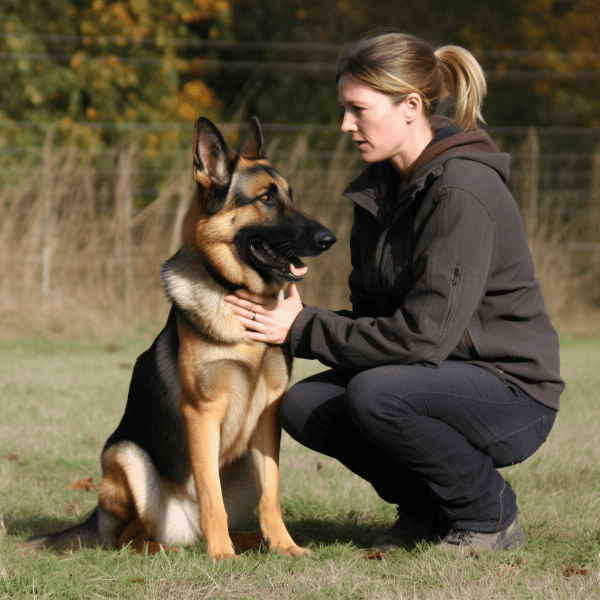Table of Contents
- Understanding the Reasons Behind German Shepherd Barking
- Training Techniques to Stop Excessive Barking
- Socialization Strategies to Curb Barking in German Shepherds
- Managing Environmental Triggers That Lead to Barking
- The Role of Exercise and Mental Stimulation in Reducing Barking
- Using Positive Reinforcement to Encourage Quiet Behavior
- Addressing Separation Anxiety in German Shepherds
- Dealing with Barking in Aggressive or Fearful German Shepherds
- Seeking Professional Help for Persistent Barking Issues
- Maintaining Consistency and Patience in Barking Training.
Understanding the Reasons Behind German Shepherd Barking
German Shepherds are known for their barking, and while it can be cute at times, excessive barking can be a nuisance and disruptive. To address this issue effectively, it is crucial to understand the reasons behind German shepherd barking.
Natural Instincts
German Shepherds are working dogs bred for herding and guarding. As a result, barking is part of their natural instincts. Barking helps them communicate with their owners and alert them of potential danger. Therefore, it is normal for German Shepherds to bark at strangers, other animals, or unfamiliar sounds.
Anxiety and Fear
Anxiety and fear are common causes of excessive barking in German Shepherds. Separation anxiety is a particular concern, as it can cause a dog to bark excessively when left alone. Fear of loud noises, such as thunderstorms or fireworks, can also trigger barking.
Boredom and Lack of Stimulation
German Shepherds are active dogs that require regular exercise and mental stimulation. Without these, they can become bored and resort to barking as a way to release pent-up energy.
Attention-Seeking
Some German Shepherds bark excessively to get attention from their owners. This behavior can be reinforced if the owner responds to the barking by giving the dog attention or treats.
Medical Issues
Understanding the reasons behind German Shepherd barking is the first step in addressing the problem. By identifying the root cause of the barking, you can develop an effective training and management plan that will help reduce excessive barking in your furry friend.

Training Techniques to Stop Excessive Barking
Once you have identified the reason behind your German Shepherd’s excessive barking, it is time to start training. Here are some effective training techniques to stop excessive barking in German Shepherds:
Clicker Training
Clicker training is a positive reinforcement training technique that uses a clicker to mark desired behavior. To use this technique to stop barking, you can click and reward your German Shepherd for being quiet. This approach can help your dog learn to associate being quiet with positive rewards and decrease barking.
Time-Outs
Time-outs involve removing your German Shepherd from the situation that is causing their barking. For example, if your dog is barking at the window, you can remove them from the room and put them in a quiet place for a few minutes. This approach can help your dog calm down and decrease barking.
Effective training techniques can help stop excessive barking in German Shepherds. However, it is essential to be patient and consistent with your training. With time and effort, you can help your furry friend learn to bark less and enjoy a peaceful home environment.
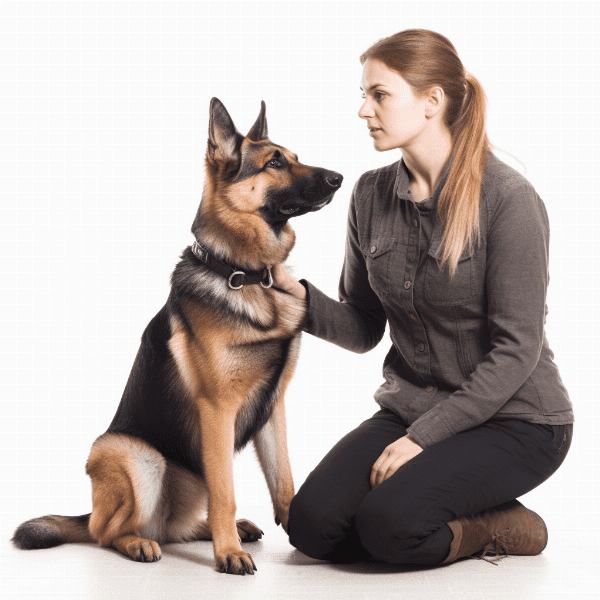
Socialization Strategies to Curb Barking in German Shepherds
Socialization is an essential aspect of training for German Shepherds. Socialization involves exposing your dog to different people, animals, and environments to help them become more comfortable and confident in new situations. Here are some effective socialization strategies to curb barking in German Shepherds:
Puppy Socialization Classes
Puppy socialization classes are an excellent way to introduce your German Shepherd to other puppies and people in a controlled environment. These classes help your dog learn appropriate social behavior and can help reduce anxiety and fear, which can lead to excessive barking.
Introducing Your German Shepherd to New People
It is essential to introduce your German Shepherd to new people regularly. This exposure can help reduce barking at strangers. When introducing your dog to new people, it is crucial to remain calm and relaxed to help your dog feel comfortable.
Introducing Your German Shepherd to New Environments
Introducing your German Shepherd to new environments can help reduce barking caused by anxiety and fear. Taking your dog for regular walks in different environments, such as parks or hiking trails, can help them become more confident and less reactive to new surroundings.
Encouraging Positive Interactions with Other Dogs
Positive interactions with other dogs can help reduce barking caused by fear or aggression. Encouraging your German Shepherd to play with other dogs in a controlled environment can help them learn appropriate social behavior and reduce the likelihood of excessive barking.
Exposing Your German Shepherd to Different Sounds
Exposing your German Shepherd to different sounds can help reduce barking caused by fear or anxiety. You can use sound CDs or YouTube videos to expose your dog to sounds such as thunderstorms, fireworks, or car horns in a controlled environment. Gradually increasing the volume over time can help desensitize your dog to these sounds and reduce excessive barking.
Effective socialization strategies can help curb barking in German Shepherds. It is essential to be patient and consistent with your socialization efforts and to expose your dog to new situations gradually. By providing positive experiences and exposure to different people, animals, and environments, you can help your German Shepherd become a well-adjusted and less reactive companion.
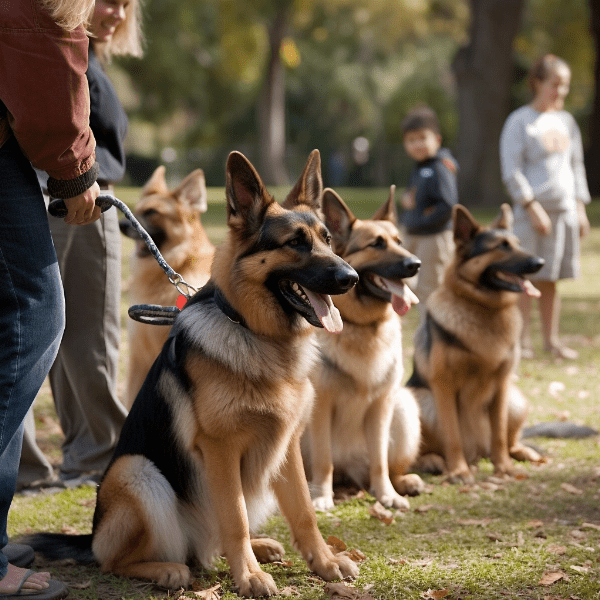
Managing Environmental Triggers That Lead to Barking
German Shepherds can be triggered to bark by a variety of environmental factors. Managing these triggers can help reduce excessive barking in your dog. Here are some effective strategies for managing environmental triggers that lead to barking:
Close Curtains or Blinds
German Shepherds can be triggered to bark at passersby or animals outside. Closing curtains or blinds can help reduce the visual stimulation that causes barking. This approach can be particularly effective for dogs that bark at specific times of the day, such as during mail delivery or garbage collection.
White Noise Machines
White noise machines can help reduce barking caused by environmental sounds, such as car horns or sirens. These machines emit a continuous background noise that can help mask other sounds and reduce barking.
Use a Crate or Playpen
Using a crate or playpen can help manage barking caused by separation anxiety. These tools provide a secure and comfortable space for your dog and can help them feel less anxious when you are not home.
Provide Adequate Exercise and Mental Stimulation
Providing your German Shepherd with adequate exercise and mental stimulation can help reduce barking caused by boredom. Regular walks, runs, and playtime can help burn off excess energy and reduce the likelihood of barking.
Managing environmental triggers that lead to barking can be an effective way to reduce excessive barking in German Shepherds. It is essential to be patient and consistent with your efforts and to address any underlying medical issues that could be contributing to the problem. By managing triggers and providing adequate exercise and mental stimulation, you can help your furry friend become a calmer and more relaxed companion.

The Role of Exercise and Mental Stimulation in Reducing Barking
German Shepherds are active dogs that require regular exercise and mental stimulation. Providing adequate exercise and mental stimulation can help reduce excessive barking in your furry friend. Here are some effective strategies for providing exercise and mental stimulation to your German Shepherd:
Regular Walks and Runs
Regular walks and runs can help burn off excess energy and reduce barking caused by boredom. German Shepherds require a minimum of 30 minutes of exercise per day, but many dogs require more. Providing regular walks and runs can help reduce barking and promote a healthy lifestyle.
Interactive Toys and Games
Interactive toys and games can provide mental stimulation and help reduce barking caused by boredom. Puzzle toys that require problem-solving, such as treat-dispensing toys, can provide hours of entertainment for your German Shepherd.
Training and Obedience Classes
Training and obedience classes can provide both exercise and mental stimulation for your German Shepherd. These classes can help improve your dog’s behavior and provide an opportunity for socialization with other dogs and people.
Nose Work and Agility Training
Nose work and agility training can provide mental stimulation and exercise for your German Shepherd. These activities require problem-solving and physical activity and can help reduce barking caused by boredom.
Playtime with Other Dogs
Playtime with other dogs can provide exercise and socialization for your German Shepherd. Dogs that have regular playtime with other dogs are less likely to bark excessively, as they have an outlet for their energy and social needs.
Providing adequate exercise and mental stimulation can help reduce barking in German Shepherds. It is essential to provide a variety of activities to keep your furry friend engaged and entertained. By providing exercise and mental stimulation, you can help your German Shepherd become a happier and healthier companion.
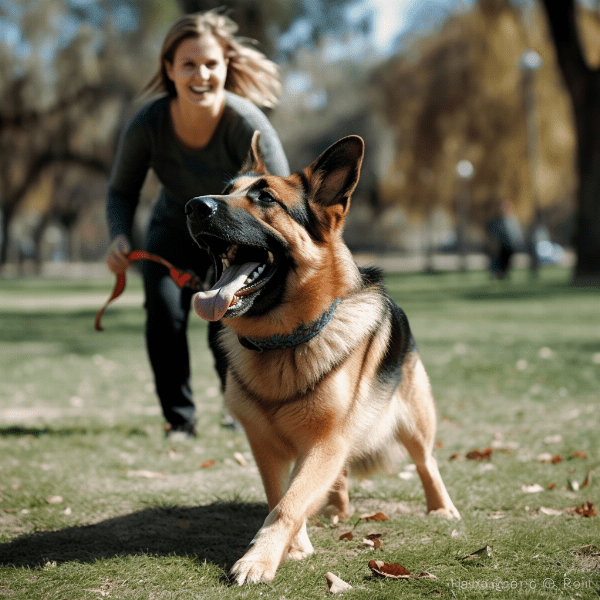
Using Positive Reinforcement to Encourage Quiet Behavior
Positive reinforcement is a powerful training technique that can be used to encourage quiet behavior in German Shepherds. Here are some effective strategies for using positive reinforcement to encourage quiet behavior:
Reward Quiet Behavior
Rewarding your German Shepherd for being quiet is an effective way to encourage the behavior. When your dog is quiet, provide praise, treats, or playtime as a reward. Over time, your dog will learn that being quiet is a desirable behavior.
Use a Clicker
A clicker can be used to mark the moment your German Shepherd is quiet, and you can follow up with a treat or praise as a reward. Clicker training is a positive reinforcement technique that helps your dog associate being quiet with positive rewards.
Teach the “Quiet” Command
Teaching your German Shepherd the “quiet” command can be an effective way to encourage quiet behavior. To teach this command, wait for your dog to start barking, then say “quiet” and provide a treat when your dog stops barking. Over time, your dog will learn to associate the command with being quiet.
Ignore Barking
Ignoring barking can be an effective way to discourage the behavior. When your German Shepherd barks, withhold attention until they stop. This approach can help your dog learn that barking is not an effective way to get attention.
Be Consistent
Consistency is crucial when using positive reinforcement to encourage quiet behavior. Make sure everyone in the household is using the same training techniques and providing consistent rewards for quiet behavior.
Using positive reinforcement to encourage quiet behavior can be an effective way to reduce excessive barking in German Shepherds. It is essential to be patient and consistent with your training efforts and to provide regular rewards for quiet behavior. With time and effort, you can help your furry friend become a well-behaved and peaceful companion.
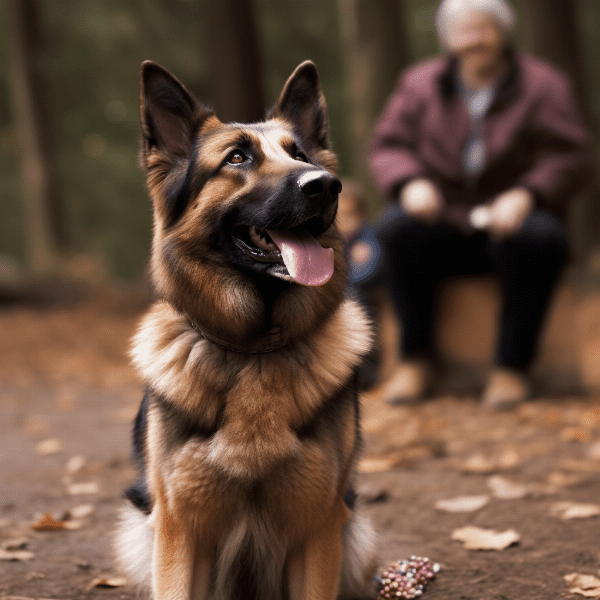
Addressing Separation Anxiety in German Shepherds
Separation anxiety is a common issue in German Shepherds that can lead to excessive barking when left alone. Addressing separation anxiety is essential to reduce barking and help your furry friend feel more comfortable when you are not home. Here are some effective strategies for addressing separation anxiety in German Shepherds:
Gradual Departures
Gradual departures involve leaving your German Shepherd alone for short periods and gradually increasing the time you are away. This approach can help your dog become more comfortable with being alone and reduce anxiety and barking.
Calming Music or White Noise
Playing calming music or white noise can help reduce barking caused by separation anxiety. This approach can provide a soothing background noise that can help your dog feel more comfortable and relaxed when alone.
Crate Training
Crate training can be an effective way to address separation anxiety in German Shepherds. Crates provide a secure and comfortable space for your dog and can help them feel less anxious when alone. However, it is essential to introduce crate training gradually and make it a positive experience for your dog.
.

Dealing with Barking in Aggressive or Fearful German Shepherds
Aggressive or fearful German Shepherds may bark excessively as a way to defend themselves or communicate their fear. Dealing with barking in these dogs requires a careful approach that addresses the underlying emotional issues. Here are some effective strategies for dealing with barking in aggressive or fearful German Shepherds:
Professional Help
In cases of aggression or fear, professional help is essential. A veterinary behaviorist or certified dog trainer can help identify the underlying issues causing barking and develop a customized plan to address the problem.
Counter-Conditioning
Counter-conditioning is a training technique that involves changing your German Shepherd’s emotional response to the things that trigger their barking. For example, if your dog barks at strangers, you can associate the sight of other people with positive things, such as treats or playtime. This approach can help reduce anxiety and fear and decrease barking.
Desensitization
Desensitization involves gradually exposing your German Shepherd to the things that trigger their barking. For example, if your dog barks at other dogs, you can gradually introduce them to new dogs in a controlled environment. Over time, your dog will become less reactive to other dogs and less likely to bark.
Avoid Punishment
Punishing your German Shepherd for barking caused by fear or aggression can worsen the problem. Punishment can increase anxiety and fear, which can lead to more barking and aggression.
Provide a Safe Environment
Providing a safe and secure environment is essential for aggressive or fearful German Shepherds. Ensuring that your dog feels safe and protected can help reduce anxiety and fear, which can lead to less barking.
Dealing with barking in aggressive or fearful German Shepherds requires a careful approach that addresses the underlying emotional issues. It is essential to seek professional help and avoid punishment or negative reinforcement. By providing a safe and secure environment and using counter-conditioning and desensitization techniques, you can help your furry friend become a happier and less reactive companion.
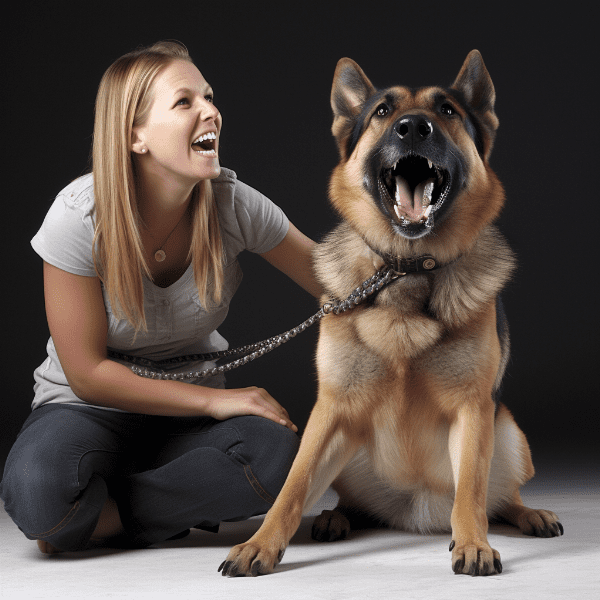
Seeking Professional Help for Persistent Barking Issues
Persistent barking issues in German Shepherds can be challenging to address, and in some cases, professional help may be necessary. Here are some reasons why seeking professional help may be necessary for persistent barking issues:
Underlying Medical Issues
Persistent barking can be a sign of underlying medical issues, such as pain or hearing loss. If your German Shepherd suddenly starts barking excessively, it is essential to rule out any underlying medical issues that could be contributing to the problem.
Severe Anxiety or Aggression
Severe anxiety or aggression can lead to persistent barking in German Shepherds. In these cases, professional help from a veterinary behaviorist or certified dog trainer may be necessary to address the underlying emotional issues causing barking.
Lack of Response to Training
In some cases, persistent barking issues may not respond to training techniques. Seeking professional help can provide access to additional resources and strategies to address the problem.
Safety Concerns
Persistent barking can be a safety concern, particularly if it is caused by aggression or fear. Seeking professional help can help address the problem and ensure the safety of both your dog and those around them.
Impact on Quality of Life
Persistent barking can impact the quality of life for both you and your German Shepherd. Seeking professional help can help reduce barking and improve your furry friend’s well-being.
Seeking professional help for persistent barking issues in German Shepherds can be an effective way to address the underlying issues causing the problem. It is essential to be patient and consistent with your efforts and to seek help from a qualified professional if necessary. By addressing persistent barking issues, you can help your furry friend become a happier and more relaxed companion.
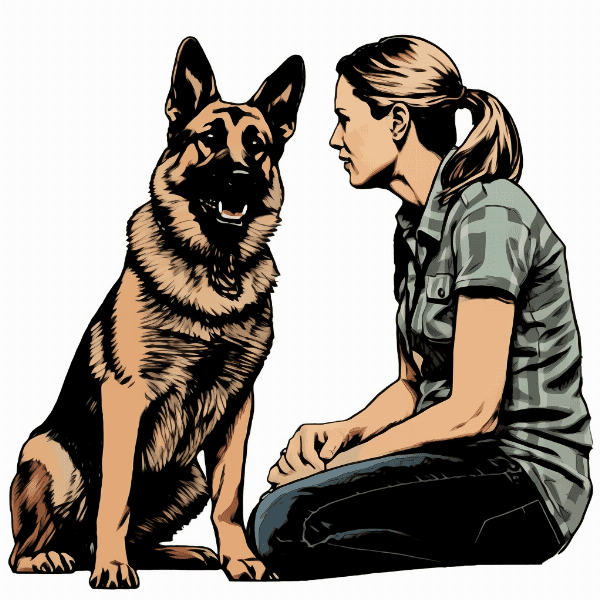
Maintaining Consistency and Patience in Barking Training.
Barking training in German Shepherds requires patience and consistency to be effective. Here are some strategies for maintaining consistency and patience in barking training:
Develop a Training Plan
Developing a training plan can help you stay organized and consistent with your training efforts. A training plan should include the specific techniques and strategies you will use, as well as a timeline for implementation.
Set Realistic Goals
Setting realistic goals is essential to maintaining patience and consistency in barking training. Goals should be achievable and focus on small steps rather than quick fixes.
Be Patient
Barking training can take time and patience. It is essential to be patient with your German Shepherd and to avoid becoming frustrated or angry.
Use Positive Reinforcement
Positive reinforcement is a powerful tool in barking training. Providing regular rewards for quiet behavior can help your German Shepherd associate being quiet with positive outcomes.
Consistency Across the Household
Consistency across the household is crucial for barking training to be effective. Everyone in the household should use the same training techniques and provide consistent rewards for quiet behavior.
Don’t Give Up
Barking training can be challenging, but it is essential not to give up. Consistency and patience are key to success, and with time and effort, you can help your German Shepherd become a well-behaved and peaceful companion.
Maintaining consistency and patience in barking training is crucial to success. By developing a training plan, setting realistic goals, using positive reinforcement, and maintaining consistency across the household, you can help your furry friend become a well-behaved and peaceful companion.
